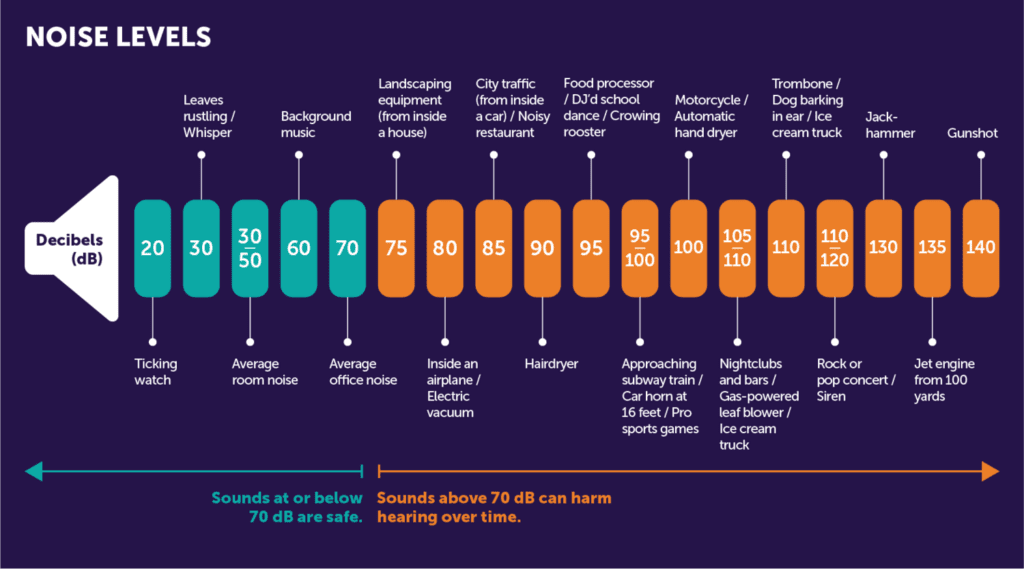Noise pollution is the spread of unwanted sounds into the environment.
Even small increases in the level of ambient noise can have a significant effect. In 2011, it was reported that scientists studying people living near seven major European airports found that a 10-decibel increase in aircraft noise was associated with a 28% increase in the use of anti-anxiety medication.
Noise above 70 dB over a prolonged period of time may start to damage your hearing. Loud noise above 120 dB can cause immediate harm to your ears. The table below shows dB levels and how noise from everyday sources can affect your hearing. Sounds at these dB levels typically don’t cause any hearing damage.
The brain is always monitoring sounds for signs of danger, even during sleep. As a result, frequent or loud noise can trigger anxiety or stress. With continued exposure to noise pollution, a person’s sensitivity to stress increases. People living with noise pollution may feel irritable, on edge, frustrated, or angry.
Noise pollution adversely affects the lives of millions of people. Studies have shown that there are direct links between noise and health.
Noise Induced Hearing Loss (NIHL) is the most common and often discussed health effect, but research has shown that exposure to constant or high levels of noise can cause countless adverse health effects include stress related illnesses, high blood pressure, speech interference, hearing loss, sleep disruption, and lost productivity.
In addition to this, unwanted sounds can have a range of mental health effects. If a person feels they cannot control the amount of noise in their environment, it impacts their mental health.
Environmental noise is also a common cause of sleep disturbance. A person may experience:
- Difficulty falling asleep
- Inability to stay asleep
- Waking too early
Sounds can also reduce the depth and quality of sleep, altering the amount of REM sleep and having an impact on mood and ability to concentrate. The physical health effects of noise pollution can occur as a direct or indirect result of noise exposure.
In severe cases, loud sounds can directly cause hearing impairment. Some forms of noise-induced hearing impairment include:
- Abnormal loudness perception
- Tinnitus which causes a persistent high-pitched ringing in the ears
- Paracusis, or distorted hearing
IMPACT ON CHILDREN
According to research children are particularly vulnerable to noise-induced hearing loss. Research studies have found that chronic exposure to noise for 8 hours a day could cause permanent hearing changes in children, including the inability to hear certain frequencies. noise pollution can affect a child’s hearing at any stage of development, including foetal, infancy, and adolescence.
Additionally, unwanted or loud noise at school or home may make it challenging for children to learn. They may experience more difficulty with:
- Concentration
- Communication and speech development
- Cognitive performance
This may affect a child’s behaviour, their ability to form relationships, and their confidence. They can also develop high blood pressure due to chronic exposure to sound.
Click here to listen as Dr. Zaidi chats with Danny Gittings at RTHK about Noise Pollution.





